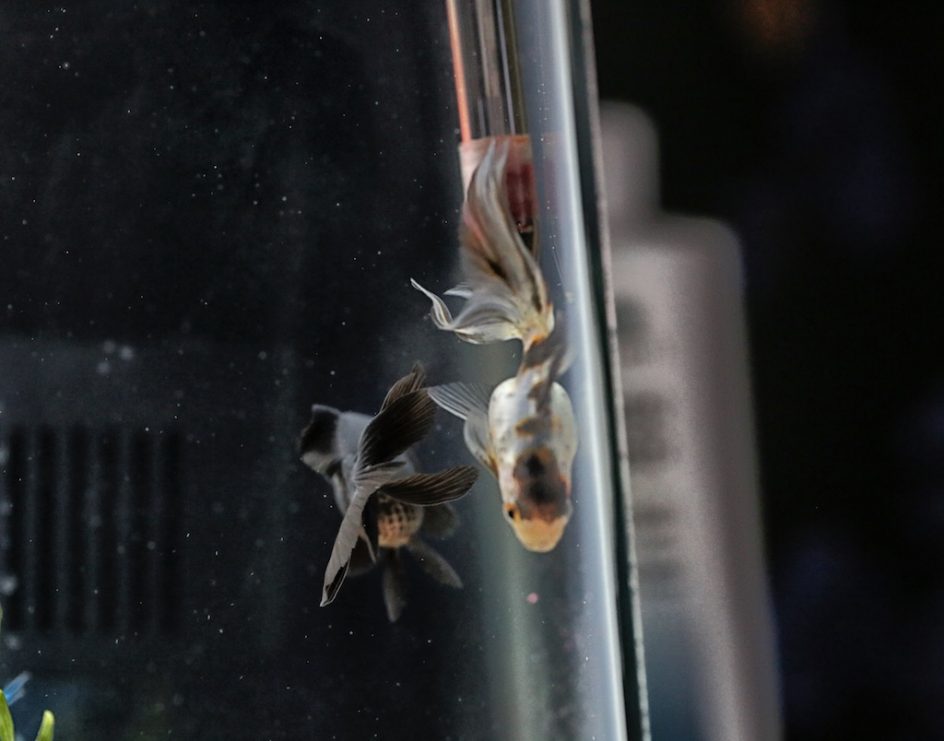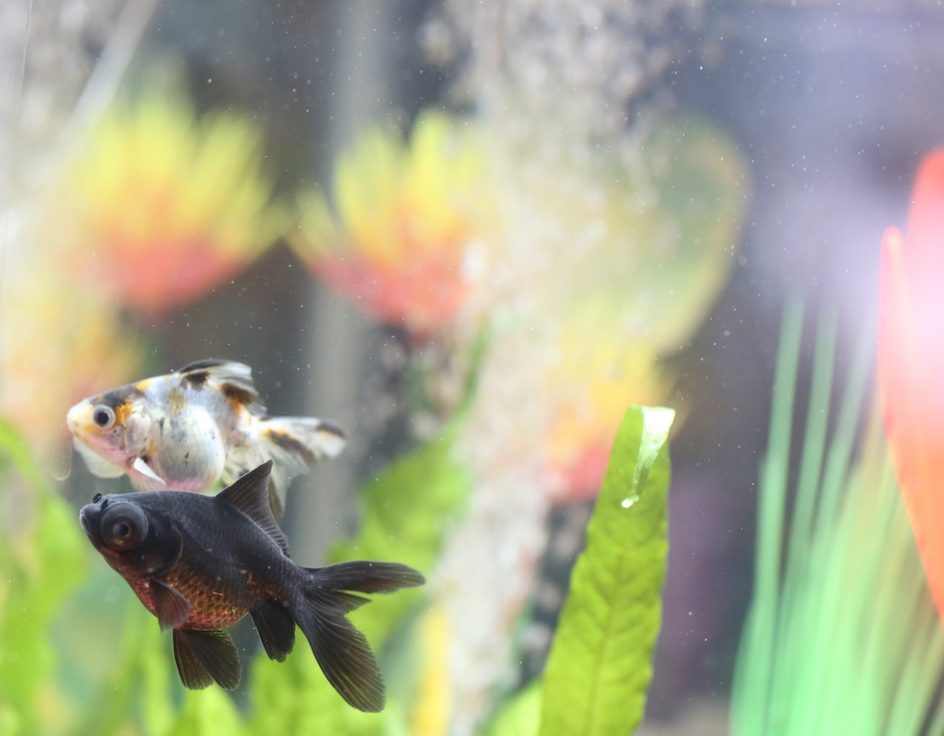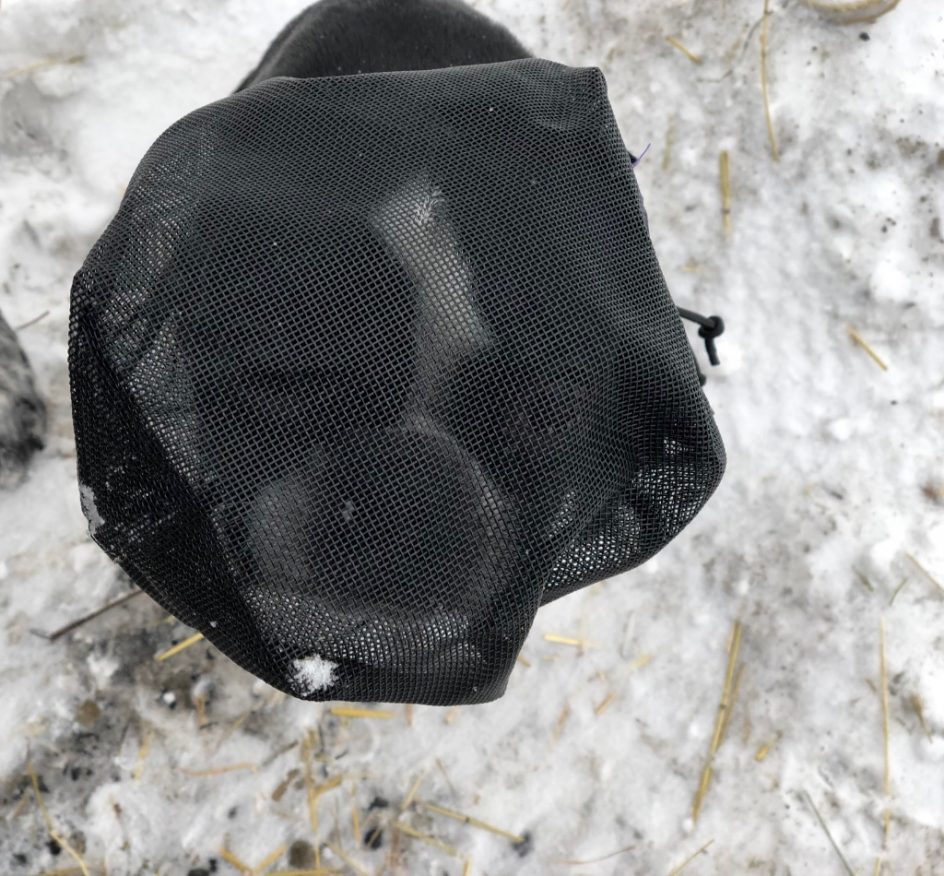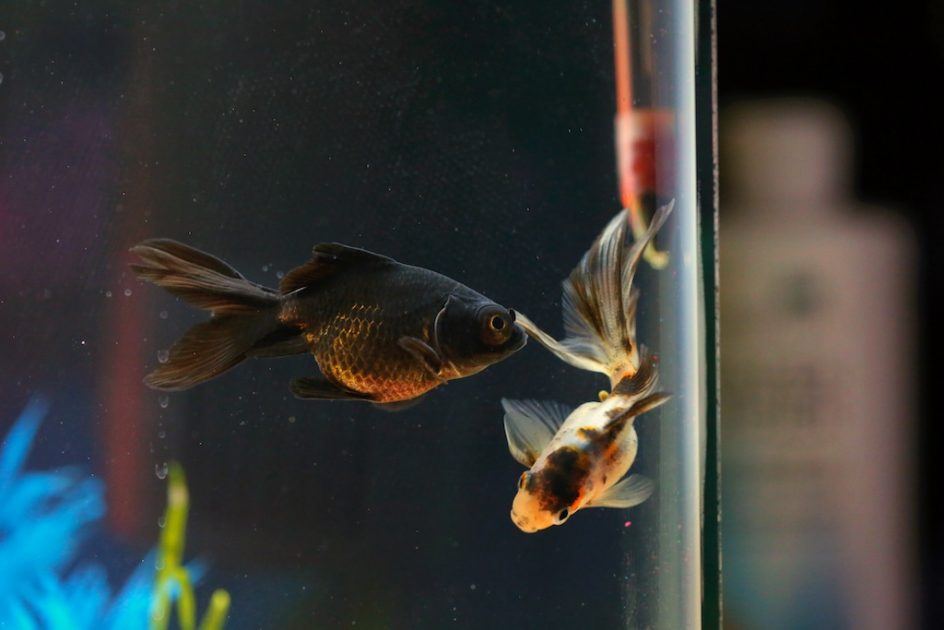
When I look at these fish, I sometimes see them dancing. Grace in the simplest of creatures. Beauty is where you look for it.

I know I am not God, I am reminded of my very limited powers every time I set foot in the Mansion and meet a beautiful person losing their mind, or meet a shell-shocked refugee child who tries to understand the taunts and threats he or she receives every day from other children here in the land of the free and the brave.
If I were God, the world would be quite different, of course, and yet I think animals often help me to get in touch with my idea of God, and to shape the world in my own image of him or her.
In his new book “God, A Human History,” the spiritual scholar Rezla Aslan writes that from the first, humans have wanted and needed a God in their lives, although there are too many versions of God to count.
“The very process through which the concept of God arose in human evolution compels us, ” he wrote, “consciously or not, to fashion God in our own image.” To do the same things to the idea of God that we do to dogs and other animals – we project our own thoughts, values and emotions onto them.
Because we love them and need them, they must be like us, or recognizable by us.I’ve seen a thousand paintings of Jesus dying on the cross but only a handful of him living in the world. We need him to suffer, I think, because we do.
When I think about my farm, I wrote once that the farmer is a God, in so many ways. He holds life and death in his hands every day. When a chicken is sick, I can condemn her to death and kill her on the spot. The residents of the farm are absolutely dependent on Maria and me for everything they must have to survive – food, water, shelter, medical care.
We can sentence them to death anytime, for almost any reason. We can also save them. The farmer is the court of last resort. So, in a different way, is the pet owner, they depend on us for their very lives.
We have taken in scores of desperate animals on our farm – dogs, sheep, chickens, donkeys, cats. By admitting them into our world, we give them life, by denying them entrance we bring them death. These often seem to me to be the roles of God.
People often speak of the unconditional love our dogs and other pets give us, but it is quite conditional to me. Their very lives depend on us every day, and no dependent relationship is truly free or unconditional, women throughout history have testified to that.
I often wonder why an oddball child like myself, a loner and book geek, would have assembled so vast an empire of helpless fish in his childhood, and I think I am old enough to begin to see why. As much or more as anything in the animal world, fish tanks are our kingdom, we create them, and shape them and give them life, and care for them or neglect them or discard them at will.
Even the neediest person must struggle to emotionalize or anthropomorphize a fish, they are among the simplest and most mechanical of living things. Yet my mailbox is already full of people’s projections the complex emotions and needs and moods of Frida and Diego, and now Pleko: look, we’ve done it already, we’ve give them names.
Am I not building another Cathedral?
Frida is adventurous, even artistic, was one message. Diego is a rascal, said another. Sometimes, Maria and I sit and watch: what are they like? What are they doing?
The process is underway. We get the animals we need. Someone warned me right away that goldfish are a “gateway” to a world of money, hard work and suffering.
I already love sitting by the tank with my camera, trying to capture their emotions and moods and grace.
If you think of the historic functions of Gods, it is almost chilling to think of the similarities to what Gods are supposed to do, and what people with animals do. I choose the tank, clean it, landscape it and give it trees and plants. I decide who will live in the tank, how many, how old, what kind. Will they have light, or not?
The fish have no way of existing beyond what we choose to give them: fresh food every day.
When their tank is dirty, we clean it, when they need air, we provide it, when it is cloudy, we make it clear, when it too cold we make it warm, when there is conflict, we are the judge and the jury, we are life and death, justice and mercy.
I can give the fish everything I didn’t have, everything I wanted. We care for them as I wish I was cared for, I give them everything I did not have. I am paying attention I am constructing a perfect world however temporal.
I am God often on the farm. Maria as well.
When we euthanized old sweet Rocky. When I put Orson down for hurting people. When I shot a chicken who couldn’t walk. When we chose to keep Gus and treat him rather than send him away or have him put to death. When I sent the old sheep off to be slaughtered. When I sent Elvis to be put out his misery and swollen legs.
And then, think of the boy. Where did he get the energy and drive to assemble his vast universe, his own kingdom of living, dependent things. How powerful he was there, how much in command, how hidden and protected from a world he saw as cruel and hopeless. It begins to make sense as I look at Frida and Diego swimming back and forth.
I imaging this brought great comfort and joy to a little boy sitting alone in his room – his parents never once remarked on all of his gurgling fish tanks, never asked him where he got the money to buy these big and wired and bubbling and brightly lit little words, what was in them, why they were there. When they were gone they were never mentioned again.
This child, who felt so powerless and weak – he wet his bed every night, almost to college – and here, in his room, he could be the God of this peaceable kingdom, to which he sustained and gave life and presided over, unchallenged and omnipotent. And so well cared for.
When you have a fish tank, you become a kind of God, at least for a bit, at least in one way. You experience the awesome challenge and power of Godliness, of Godness. Small acts of great and resonating kindness.
Of course we humanize God and the divine, how else are we to comprehend it? When we endow God with human attributes, writes Azlan, we divinize those attributes, so that everything good or bad about religion is merely a reflection of everything that is good or bad about us.
We create a super being endowed with human traits, but without human limitations. Sometimes, the world doesn’t have to be human at all.
I stood before my fish tank this morning with my camera, and set out to humanize Frida and Diego. What else could I do, what else could be expected of me to do?
Forgive me, I said to the fish as I sat watching them, exploring this primal, ancient and eternal form of spirituality.
I know i have life and death power of you, and I know Maria and I will be good to you. And I know you will never grasp or understand what I am telling you. But I need to say it, anyway.
But I am just me and you are just fish. It may be that you are God, come to lead and nurture me. No fish was ever born arrogant.

FInally, after two weeks of experimentation, we got the right muzzle for Gus. It’s called the Outfox Field Guard, and it’s made in San Francisco.We ended up spending a bit of money on this process and a lot of time. It’s important. We went through five different muzzles before we found one Gus instantly accepted, and that fastens securely over his color.
He can run with it on, even drink with it on, and he doesn’t seem to notice that it’s there. This muzzle is comfortable, it isn’t rigid and doesn’t press against his eyes, or slip off of the snot, at least not so far, and we took it out three times, twice in today’s snow storm.
He chased Fate and Red, nosed up against the sheep, got kicked accidentally by Lulu when he ran underneath her feet (he’s fine).
Not surprisingly, the muzzle is the most expensive one we tried, it was $46 dollars, but worth it for us. Gus cannot go outside with his megaesophagus unless he is restricted from eating feces and other stuff out there that makes his illness worse.
The other muzzles were either too hard, too narrow, poorly attach to the dog’s head or obstruct vision. Nothing will panic a dog quicker than that. The Royal Canin muzzle was the only other one we really considered.
The field guard is good for any outdoor dog in the woods who has trouble digesting what they eat. It attaches to the collar with two velcro straps, and he doesn’t seem to even know that it’s on. This is the only site that asked for the name of the breed and offered a wide range of sizes.
Unlike most, it was not hard, didn’t press on or obscure the eyes, and is simple but efficient at attaching to the dog. These two straps just so over the collar, it would take a lot to jar them loose.
Gus has megaesophagus and he cannot eat anything but the special food and diet that keeps his food from regurgitating. This is essential to his well being and survival.
This is the muzzle for Gus, he can now resume his life as a farm dog and go on walks with us. A good step forward. Grateful to this company, they know what they are doing and seem to have a good grasp of what the customer and dog want and need. So many dogs get sick from eating things out in the woods, this could be important to others.
It’s strange to see Gus with this guard on his head, but more for us than for him. Dogs are nothing if not adaptable.

“Not till we are lost, in other words, not till we have lost the world, do we begin to find ourselves and realize where we are and the infinite extend of our relations.” — Henry David Thoreau
I’m reading the latest biography of Henry Thoreau, and one of the best. It was written by Laura Dassow Walls. I’ve always been touched by the particular quote above, Thoreau was lost a number of times in his life – when a woman he loved refused to marry him, when the school he began with his brother collapsed, when his poems and essays were rejected repeatedly, when he was utterly confused about what to do with his life
He found himself when he went to Walden Pond against the advice of almost everyone in his life and he spent a year there writing about nature, and publishing his landmark work, “Walden.”
The book was ostensibly about his year alone on a beautiful pond, but perhaps more importantly, about his lifelong search for identity and self-respect and independence.
I think he’s quite correct about sometimes having to be lost before we can find ourselves. I believe most people do not really consider their lives in the way Thoreau did, they simply live them and react to the wishes and demands of other people.
Identity and individuality are very difficult to achieve in our culture, where everyone is so instantly labeled, and were different ideas are considered hateful or threatening. Ideology is, to me, a dangerous and soul-killing thing sometimes, whether it comes from the left or the right, each are beginning to more closely resemble the other.
We have lost the art of listening, and we seem to be losing the art of thinking for ourselves as well. In recent years, Thoreau has been ridiculed a bit because his mother came to the pond to bring him summer at times, and he often visited his friend Emerson who lived a few miles down the road.
But that isn’t the point. When I came uptate to spend a year in my cabin, I had friends just down the hill and was never more than a couple of minutes from a grocery store. The idea wasn’t that it was dangerous, or that my life was threatened, but that I just needed to find myself.
The American idea of adventure is to go out and endanger oneself, and commit Hollywood style acts of bravery and survival. My idea of adventure is to be lost, and then found again, and not just in the wild. Inside of yourself. Reading the book, I understand Thoreau much better, I have always admired him.
Many of you have witnessed – uncomfortably in some cases – my sometimes angry quest for identity and individuality in a world where now who wants to mind my business can do so instantly and for free. When I first became a writer, I shared my life in books, and no one could jump on my ideas before they had a chance to breathe.
That is changed, and I am slowly being dragged along with it, grudgingly, but to some extent acceptingly, I love this world of interactivity and dialogue, it feeds and nourishes me as well as challenges me.
When Thoreau wrote of being lost, his idea had some time to breathe before hundreds, even thousands of people, were on top it, telling him what he should have said or might have said, or said in the wrong way. I don’t think he would have cared for it, but I think he would have come around to it.
After all, being found is about understanding who you are and what you stand for, it means speaking your truth and respecting what you see in the mirror. I knew I was finding myself when I didn’t look in that mirror and want to jump in a raging river.
I remember the first time I looked in the mirror, and thought “oh, so that’s who you are. You are finding your path, you are going to be okay. You are standing in your truth.” That was a magical moment, and Thoreau found his moment at Walden Pond.
I found mine on the top of a mountain in upstate New York very much alone except for two loyal dogs who were with me every step of the way. Sometimes we do have to get lost to get found.